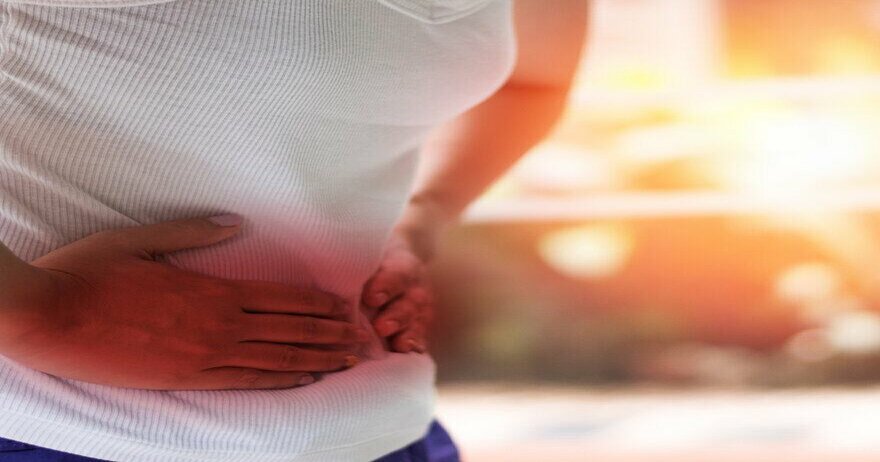Do you know where bad gut bacteria lives?
And do you know how to get rid of bad gut bacteria?
The gut microbiota or microbiome is a complex system of millions of bacteria that live in the gut, mouth, and on the skin. These microbes help you digest food, fight off infections, and regulate your immune system.
But when there’s an imbalance in this ecosystem—known as leaky gut, or bad gut bacteria—it can cause digestive issues and other health problems.
Let’s dive into this article on how to get rid of bad gut bacteria.
Bad Gut Bacteria Is an Imbalance in Your Microbiome
Your gut microbiome is a key part of your immune system and can have a big impact on your overall health.
In addition to diet and lifestyle choices such as losing weight quickly, some factors that can affect your microbiome include environmental toxins, antibiotics, and birth control pills.
Fortunately, there are things you can do to restore balance in your gut microbiome!
Good gut bacteria help digest food, fight off infections, and maintain a healthy balance of hormones in your body.
When the gut microbiome is out of balance it can cause digestive issues such as heartburn or irritable bowel syndrome (IBS).
It’s important to know how to keep bad gut bacteria at bay so that you can enjoy all the benefits of having good gut bacteria!
An Imbalanced Microbiome Can Cause Digestive Issues
A balanced microbiome is a key to good health, but a poor diet and stress can cause your gut bacteria to become imbalanced. This can lead to digestive issues and other health problems like bloating, gas and constipation.
The good news is that you can improve your gut bacteria by making some changes in your diet or lifestyle.
A Vital Part of Your Health System
You probably have a pretty good understanding of what bacteria is.
They are the tiny little bugs that live everywhere, from your skin to your gut to your nose.
They help keep us healthy because they help us digest food and produce vitamins.
But you may be surprised to learn that our bodies are made up of trillions of bacteria—more than any other type of cell!
The microbiome is an important part of human health, so understanding how it works can help prevent disease and improve wellness for everyone.
What Factors Affect Your Microbiome?
You may be asking yourself, what causes harmful bacteria to grow in your body?
Well some of the factors that can have an impact on your microbiome include diet, environmental toxins, and antibiotics.
Your Diet
The gut microbiome is very sensitive to diet, so it’s important to maintain a healthy eating plan if you want to keep bad bacteria at bay. A high in fat meal can give rise to bad bacteria in your gut by changing the pH in your intestines so they become less acidic.
This enables bad gut bacteria to thrive in that area.
Eating lots of sugar also makes it easier for these pathogens to grow because sugar feeds the bad gut bacteria (similarly, taking antibiotics can feed bad gut bacteria as well).
Environmental Toxins
Exposure to toxins such as pesticides or pollution can affect your digestive system and cause changes that allow pathogenic organisms such as E. coli or salmonella (a type of food poisoning) into your body.
They can also colonize your gut flora – thus causing inflammation that may lead eventually to chronic diseases like Irritable Bowel Syndrome (IBS) or Ulcerative Colitis.
Depression and Bacteria
Did you know that the bacteria in your gut and the way they interact with your brain could be causing depression?
Research shows that there’s a strong link between bad gut bacteria and depression. In fact, there are several studies that show correcting gut health can improve symptoms of depression, anxiety, OCD, and more.
What does this mean for you?
Well, if you have any of these conditions and have been looking for natural ways to manage them, it might be time to consider changing your diet and supplement routine!
The Good Bacteria in Your Gut Help Break Down Nutrients
As food passes through your system, the good bacteria in your gut help break down nutrients. They also help with digestion and nutrient absorption, as well as nutrient breakdown and metabolism.
To help kickstart the process of getting rid of bad bacteria in your gut, try following these steps:
- Eat Plenty Of Fiber
- Avoid Sugary Foods And Alcohol
- Focus On Eating A Healthy Diet
A healthy gut microbiome is essential to maintaining good digestive health. If you have poor gut health and excessive bad gut bacteria, then it’s likely that you’ll experience a range of unpleasant symptoms like depression, anxiety, bloating or constipation.
If you have any of these symptoms, it’s a great idea to speak to your doctor about improving your gut health.
Take Additional Probiotics
In some cases, it’s necessary to take additional probiotics when you’re trying to restore balance in your gut microbiome. Probiotics can help restore the balance of good and bad bacteria in your gut by increasing the number of good bacteria you have while reducing the number of bad ones. Probiotics are available as a supplement or can be found in foods like yogurt or kefir.
Probiotic supplements come in different forms: pills, powders, and tablets; liquid suspensions; and food products like fermented vegetables or dairy products that contain live cultures (like cheese).
Digestive Enzymes Will Help Break Down Fats and Proteins More Efficiently
Digestive enzymes are used by the body to break down fats and proteins, as well as carbohydrates.
They also help the body get more nutrients from the food you eat.
Digestive enzymes are not the same as probiotics, which is a different kind of gut bacteria that resides in your digestive tract. Digestive enzymes can be taken in capsule form or liquid form.
A Cleanse Can Be Useful
A cleanse is a great way to flush out toxins from your body. This can be especially useful if you have consumed too much bad bacteria, or if you have come into contact with someone who has been afflicted by it.
A cleanse can also help with weight loss and lower cholesterol levels, as well as provide other health benefits.
However, you mustn’t attempt to cleanse or get rid of bad gut bacteria, on your own—it should only be done under the supervision of a medical professional.
If you decide to do a cleanse anyway without consulting one, make sure that it lasts at least a few days so that your body has enough time to rid itself of all the harmful microbes inside it before they have time to grow again (and cause further damage).
How To Get Rid of Bad Gut Bacteria? Look After Yourself
If you feel like you have a bad gut bacteria imbalance and want to get rid of it, there are many options available. You can start by checking out your diet and making sure that it is full of healthy foods.
Additionally, taking probiotics or enzymes might help clean out some bad bacteria from your system.
If these methods don’t work for you then consider doing an herbal cleanse or trying a natural supplement to replenish good gut bacteria.
Other natural remedies such as Epsom salt baths have also been shown to aid in detoxification as well.
For more on how to get rid of bad gut bacteria be sure to consider choosing us as one of the health and wellness clubs you join.



